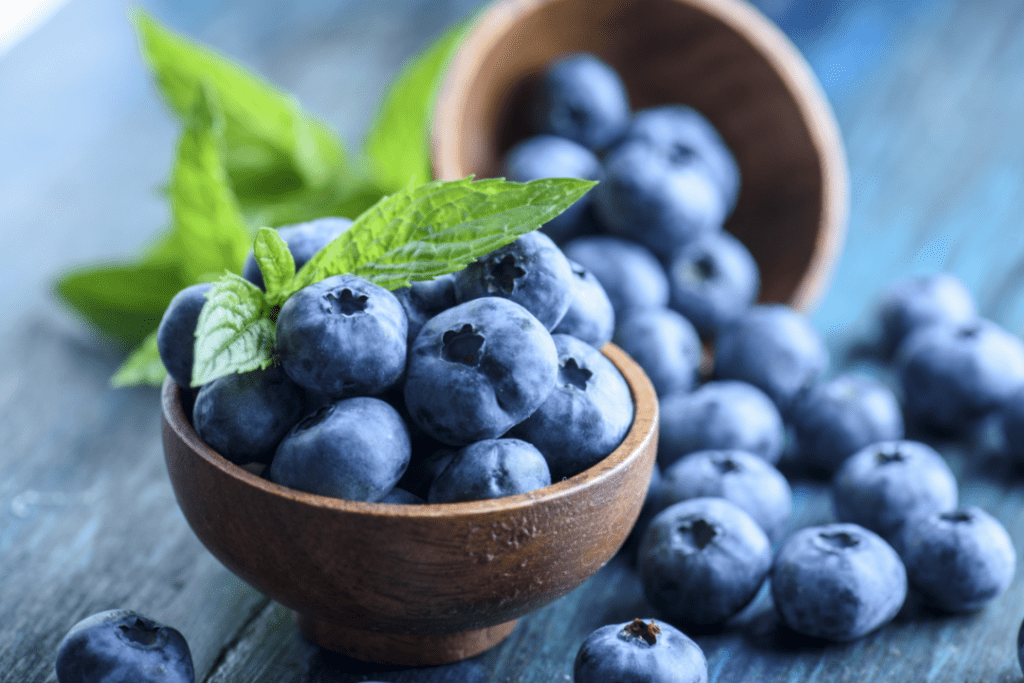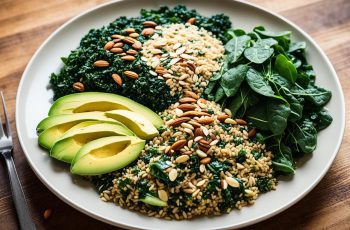One of nature’s best cures for the blues, it’s also one of nature’s best-tasting berries. Yes! Your guess was spot on. The subject at hand is the blueberry. There are numerous health benefits of blueberries. After all, it is regarded as a miracle food by many. But first, let’s take a closer look at what makes blueberries so special.
Having a balanced diet is essential for good health. Fruits play a major role because they provide an abundance of nutrients. In several life periods, including pregnancy, recovery from disease, epidemic, and other transitional phases, nutrition plays an important role. Fruits, on the other hand, can help you maintain a healthy weight. There is also a reduction in the risk of chronic disease, which in turn improves overall health. As an example, blueberry is a nutrient-packed fruit.
What is a Blueberry?

Ericaceae, the heath family, is known for its tasty, brightly colored berries. Flowers in the genus Vaccinium are commonly referred to as blueberries. We can all agree that the sensation of popping a blueberry in our mouth and savoring the burst of juice is wonderful. The most commonly planted blueberry is highbush.
Types of Blueberries
There are majorly four types of blueberries:
- Highbush
- Lowbush
- Hybrid half-high
- Rabbiteye
Nutritional Facts
Half a cup (approx. 80grams) serving of blueberries contains:
- Calories: 42
- Protein: 1 gram
- Sugar: 7 grams
- Fat: Less than 1 gram
- Carbohydrates: 11 grams
- Fiber: 2 grams
These berries have a glycemic index of 53. (GI). Using this test, you can find out how quickly a particular food can elevate your blood sugar. There’s more to it than that, of course. The blueberry fruit has a lot more to it than just the health benefits that come from eating it.
Dietary fiber is found in blueberries. Fibre, as we all know, is good for your digestive system since it aids digestion. Blueberries are also an excellent source of vitamins and minerals, including:
Vitamin C
Citrus alpha-tocopherol is another name for ascorbic acid. The antioxidant vitamin C in blueberries aids in the healing of wounds. Additionally, it aids the body’s ability to fight against diseases. It’s also a potent antioxidant. Collagen, a fibrous protein found in the body’s connective tissues, can’t be produced without it.
Vitamin A
Deficiency in Vitamin A can lead to a variety of health problems, including blindness. Organs such as the heart, lungs, kidneys, and skin and hair are all included in this category. Sebum production is also aided by it, which improves the skin and hair’s moisture levels.
Vitamin K
There are a number of proteins that are necessary for blood clotting and bone development to be made by vitamin K or phylloquinone (K1). Prothrombin is the name of one of them. Preventing blood clots is a vital function of vitamin K-dependent protein Prothrombin in the body. Another protein, osteocalcin, is dependent on vitamin K for the production of healthy bone tissue.
Manganese
Manganese is essential for the metabolism of amino acids, cholesterol, carbohydrates, and glucose in the human body. Blood clotting and hemostasis are made easier as well as bone growth. Manganese and vitamin K are both found in blueberries, making them an excellent source of both nutrients.
Antioxidants
The blueberry’s key nutrient is undoubtedly its antioxidants. Numerous advantages are touted, such as anti-aging properties, improved vision, and improved cardiovascular health. Adults over the age of 60 are most likely to suffer from AMD or age-related macular degeneration. The eyes and skin of the elderly are the most affected by the antioxidants in blueberries.
Iron, phosphorus, calcium, and zinc are also found in small levels in blueberries.
Health Benefits of Blueberries

1. Help boost immunity and strengthen muscles.
Muscle growth and healing can be boosted by consuming blueberries. Sore muscles are enough to warrant a break from the gym. That delay, though, can quickly evolve into a habit of skipping workouts. Isn’t it obvious to everyone?
To become stronger, muscle fibers need time to recover and adequate nutrients. When you eat blueberries, your muscles will mend themselves more quickly.
2. May protect from urinary tract infections.
Humidity in the urinary tract is a common entry point for bacteria. Blueberries have been found to help eliminate bacteria on the urinary system lining, according to research.
Bacteria on the bladder wall can be prevented from growing and thriving by ingesting blueberry fruit. E. coli, a common cause of urinary tract infections, is one of the microorganisms that this treatment targets specifically (UTIs).
3. Help in strengthening bones.
Nutrients such as manganese and iron are found in abundance in blueberry fruit. Blueberries’ nutritional value is boosted with the addition of these substances.
In order to preserve the suppleness and strength of bones and joints, both iron and zinc are critical. Calcium, on the other hand, aids in bone density. Osteoporosis, especially in women over the age of 40, is reduced as a result. Weak bones are more likely to break and require more time to recover. Vitamin K in blueberries helps to strengthen bones and speed up healing time.
4. Help fight depression.
In addition to the numerous health benefits of blueberries, they can also have a beneficial effect on the mind and body. Blueberries, on the other hand, can alleviate your Monday blues. Isn’t it remarkable, to say the least?
Flavonoids in blueberries, according to research, help keep neurological networks running smoothly. Neuroplasticity is improved as well. As a whole, the health benefits of blueberries extend beyond the physical to the mental as well. That’s how it works to alleviate the symptoms of depression.
Eat some raw blueberries the next time you’re feeling down to lift your spirits. It’s all about the food and the mood!
5. Improve insulin sensitivity.
Flavonoids, a class of plant pigments, may aid diabetics’ glucose metabolism. Obese and insulin-resistant individuals may benefit from flavonoids’ ability to increase insulin sensitivity. As a result, blueberries help to reduce the chance of acquiring type 2 diabetes in those who consume them.
Blueberries also have a favorable effect on obesity caused by a high-fat diet (HFD). Polyphenol Extract (PPE) in blueberries has been shown to reduce weight gain and restore normal lipid metabolism. This has made blueberries a household name. Moreover, they are both nutritious and tasty.
6. Improve memory and brain function.
Flavonoids are found in blueberries. Antioxidants are found in these Flavonoids. Flavonoid-rich foods like blueberries, according to a new study published in July 2021 based on research, reduce cognitive difficulties by 20%. Neurology, the journal of the American Academy of Neurology, has an online link to this study.
Antioxidant powerhouses in the blueberry fruit include flavones and anthocyanins. By protecting and strengthening neuronal connections, the anthocyanins in blueberries also help in communication. As a result, mental agility and recall are enhanced.
7. It may help fight Cancer.
Blueberries include antioxidants and phytochemicals that help neutralize free radicals. In addition, these radicals could harm your DNA profile. When these free radicals aren’t treated, they can cause serious DNA damage and lead to malignant disorders.
Evidence of anti-cancer properties in blueberries comes from a study conducted by the American Institute for Cancer Research. As a result, consuming blueberries on a regular basis will help the body combat malignant cells. Those who smoke may also benefit from blueberries’ high vitamin C content, which has been linked to a lower risk of colorectal cancer and lung cancer. Additionally, it has been shown to lower the risk of malignancies of the mouth and stomach.
8. Has anti-aging properties.
Blueberries have an anti-aging effect on the body when consumed regularly. Pterostilbene and anthocyanin are to blame. 42 calories can be found in a half-cup serving of these luscious berries. It contains 24% of the recommended daily intake of vitamin C. To keep the skin’s suppleness and firmness, you need to increase the creation of collagen. It helps to keep skin looking young and healthy by speeding up the restoration of damaged cells.
The creases and lines on your face will disappear if you eat a dish of fresh blueberries.
According to recent research, blueberries have the ability to influence signaling pathways associated with inflammation and cell viability. It also improves neuroplasticity and protects neurons from damage. Because of this, blueberries can also aid in the battle against neurodegenerative illnesses.
9. It strengthens metabolism.
Maintaining a healthy metabolic rate in the body is critical to overall well-being. Blueberries are, in fact, a nutritious fruit. There are numerous chemical interactions taking place in the human body to keep things running smoothly. Multiple metabolic processes in the body benefit from the blueberry’s manganese and potassium content.
Having a low potassium level in your body may result in a decreased production of insulin. The effect could be an increase in blood sugar. Type 2 diabetes is more likely as a result, which is a shame. If you’re concerned about diabetes, this superfood can help you avoid it. Potassium and other elements found in blueberries suggest that they may be beneficial in the prevention of diabetes. Manganese, on the other hand, aids in the utilization of numerous vitamins, including thiamine. It also improves liver function, which is beneficial to health.
Non-alcoholic fatty liver disease affects a large number of people all over the world. To treat NAFLD, blueberries contain anti-inflammatory and anti-apoptotic effects. This means that blueberries have an important function in boosting metabolism.
10. It reduces the risks of heart disease.
LDL cholesterol levels can be reduced by eating blueberries. If LDL builds up in the arteries and causes a blockage, it can be dangerous. Having coronary artery disease is a life-threatening issue for those who have it. Heart disease risk can be reduced by up to 15 percent by eating one cup of blueberries daily, according to a recent study.
Blueberries include anthocyanin, a potent antioxidant that significantly decreases the levels of harmful cholesterol in the body. As a bonus, it improves artery flow and reduces the risk of stroke. A whopping 25 distinct anthocyanins are found in blueberries, making them the king of the berries.
Anthocyanin, the pigment that gives blueberries their brilliant hue, is another product of this nutrient. Free radicals are removed from the blood, and different diseases are prevented.
Dietary fiber, antioxidants, and other nutrients found in blueberries help the body stay healthy and fight against a variety of ailments. In addition, the flavonoids in blueberries help to heal cell damage and enhance the body’s immune system.
Adding Blueberries to Your Daily Meals

Here are a few ideas on how to incorporate blueberries into your regular diet in a fun and exciting way.
- Using blueberries and fresh yogurt in a fruit salad is a delectable way to do it.
- A pancake can be topped with blueberries. You can’t go wrong with pancakes with blueberries in them.
- Blueberry muffins can be made at home.
- Upgrade from a simple apple pie to a decadent blueberry one.
- Blueberries can be used to make smoothies and milkshakes.
- Snack on blueberries while at work. Before eating the blueberries, wash them thoroughly.
- Fresh blueberry juice can also be made.
- Adding dried blueberries to ice creams and sweets is an easy way to add color and flavor. You can give it a go.
The best ways and times to eat blueberries
Late at night, do you crave a blueberry smoothie? Inquiring as to whether blueberry pancakes can be served before dawn is a common question. You very certainly can. Blueberries can be eaten at any time of day or night. As a result, you can eat blueberries at any time if you have a nutritious snack in mind.
The healthiest way to eat blueberries is to add them to your smoothie. Chia seeds and yogurt can be used to make a satisfying smoothie.

What’s the occasion for a social gathering? Make some ice cubes with blueberries. Fill the cube pan halfway with water, then add a few blueberries to each cube. They’re great served frozen and paired with just about anything.
You can have a fruit salad for breakfast or a blueberry dessert for dessert. You can also eat blueberries before going to sleep. Blueberries are high in antioxidants, so eating a handful before bedtime can help alleviate stress and improve the quality of sleep.
Who Shouldn’t Eat Blueberries, and Why?
Despite the fact that blueberries are generally considered to be a healthy food option, there are a few things to keep in mind. No two people are alike. Hives, swelling, and other symptoms are all signs that the body’s immune system is reacting to a specific protein and is allergic to that food or vitamin. Allergies to particular foods are rather prevalent. Additionally, an overdose can result in serious health complications. Overindulgence, after all, can have negative consequences.
Frequently Asked Questions (FAQs)
Q. What is better for you, strawberries or blueberries?
The family tree of both blueberries and strawberries includes both. As a result, both are beneficial to your health. But blueberries have a few additional benefits as well.
Q. What is the healthiest berry in the world?
All of the aforementioned berries are loaded with vitamins and minerals. All of them are beneficial to health in their own unique ways.
Q. Are blueberries good for weight loss?
Is it a superfood? YES. Blueberries contain a number of weight-loss-promoting nutrients and minerals.
Q. Is it bad to eat 150gm of blueberries?
A. No, but eating 150 g of blueberries a day is good for your heart. It is safe to consume 150 g of blueberries per day if one does not have an allergy to them.
Q. How many carbs are in 100g of blueberries?
A. Blueberries contain 9.1 grams of carbs or 4% of their weight. Based on the average adult’s RI.
Q. Are blueberries high in sugar?
No, they do not have a lot of sugar in them. A moderate amount. A half-cup serving of blueberries, for example, has a whopping 7g of sugar.
Q. How many blueberries should you eat in a day?
A. There is no fixed limit, however. Some research suggests that eating 150 grams of blueberries a day is beneficial for your health. It’s important to remember that everything is only good if consumed in moderation.
Q. What happens if you eat too many blueberries?
Either too little or too much can be harmful. Take, for instance, the case of overindulgence in blueberries. This could lead to a vitamin K and fiber overdose, which can lead to various diseases.
Q. What are the benefits of blueberries?
One of the health benefits of blueberries is their abundance of antioxidants, which can improve cardiovascular health, brain function, muscle strength, and bone density. It also boosts the body’s defenses.
Q. How many calories are there in one cup of fresh blueberries?
About 84 calories are in a cup of blueberries, according to the USDA.
Q. What happens if you eat blueberries every day?
As a result, it has been shown to improve metabolic health and reduce the risk of cardiovascular and neurologic disease.
Q. Are blueberries healthy at night?
A. That’s correct. It’s good for you. Blueberries, for example, have been shown to reduce stress and boost mood.
Q. Are frozen blueberries good for you?
Frozen foods keep their nutritional value because they are kept at a constant low temperature. However, berries can lose some of their nutritional value when they are frozen.




